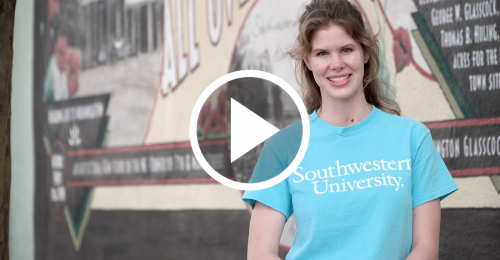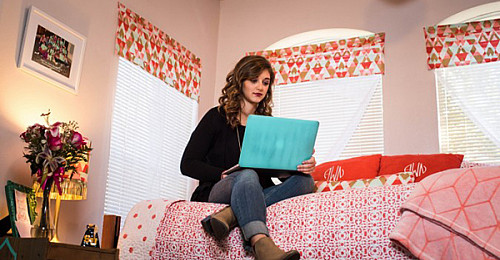- Residence Life Statement
Living while learning together is an important aspect of the Southwestern Experience. Guided by Mosaic’s key areas of development, SU’s Residential Experience empowers students to be active and engaged community members, developing both lifelong friendships and skills such as responsible decision making, problem-solving, and teamwork. On-campus living involves day-to-day interaction with people of varying backgrounds and values, the opportunity to continue the discussions and debates of the day’s classes, and firsthand experience in community building.
Our team of professional staff and resident assistants supports students in developing a positive and inclusive environment of respect while engaging in meaningful and sometimes challenging conversations. Through intentional collaboration with departments across campus, the Residential Experience hosts in-hall educational programs and provides resources that facilitate—and encourage connections between—intellectual and personal growth. Through these activities, we provide stimulating learning experiences that are personalized to residents’ needs, challenges, and interests, from academic achievement in the first year to career readiness in the last. Our sequenced programs provide students what they need, when they need it most.
As is true in any community of people, some commonly accepted standards or guidelines are necessary to facilitate the provision of an academically supportive environment and to guarantee mutual respect and dignity among the members. This section of the Handbookprovides a review of information and guidelines relevant primarily to students living on campus and is not a complete statement of University policies concerning student life. Students should become familiar with all sections of the Student Handbook and also consult the Southwestern University Catalog for a complete review of University policies regarding student and residence life.
- On-Campus Residency Requirement
Those students who have had less than four full semesters in college will be required to live in University residence halls. While living on campus, each student, except those living in the Lord Residential Center, the Dorothy Manning Lord Residential Center or the fraternity houses, must purchase a meal plan from the University’s food service. Requests for medical exemptions from the food service requirement may be addressed to the Dean of Students.
On-Campus Housing
Brown-Cody Hall
Herman Brown Hall
Ernest L. Kurth Hall
Dorothy Manning Lord Residential Center
Grogan and Betty Lord Residential Center
J.E. and L.E. Mabee Hall
Martin Ruter Hall
Charline Hamblin McCombs Residential Center
Moody-Shearn Hall - Resident Bill of Rights
Every person in the residence hall community has certain rights and also certain responsibilities. Residents are encouraged to keep in mind that all persons in the hall have the same and equal rights. A description of these rights and responsibilities follows to provide residents with a foundation for assessing and resolving individual and community problems. Residents also are reminded that RA’s and other members of the Residence Life Staff are available to assist in solving problems.
1. A resident has the right to privacy;
2. A resident has the right to an atmosphere conducive to study and sleep; 3. A resident has the right to a safe and healthy living environment;
4. A resident has the right to request that guests and visitors adhere to University policy;
5. A resident is responsible for communicating clearly and directly with others (roommate, student staff, other residents, etc.) in the event that disagreements or conflicts arise; and
6. A resident is responsible for contributing to the general welfare and quality of life in the halls by avoiding behavior that diminishes the safety, security, or serenity of others. - Residence Hall Staff Members
Area Coordinators: The primary duties of these positions include programmatic and administrative management within Residence Life, operations, staff supervision, and working with various aspects of housing and RA’s.
Coordinator of Residential Operations: This staff member oversees the overall administrative responsibility for the effective operation of the residence hall program. The Coordinator of Residential Operations works closely with the department’s Area Coordinators and student staff to formulate effective residence hall management and to enhance individual student support through collaboration with other University offices.
Resident Assistants: Selected upper-class students hold positions of responsibility within the residence halls. These students or “RA’s” provide direct assistance to the students in their living area (about 30 per RA in upper-class halls/15 per RA in first-year halls) by providing information, helping to ensure that University community standards are met through brief counseling and/or referral, offering acquaintanceship, fulfilling basic administrative tasks, and helping organize interesting educational, social, and recreational events and programs.
- Housing Services and Terms
Alcohol and Drugs: University policy prohibits the use of illegal drugs and the public possession or consumption of alcohol. Please refer to “Personal Conduct Policies” (see Section VIII) for an explanation of University policy regarding alcohol and drugs.
The Residence Life Staff is charged with maintaining an atmosphere conducive to students’ successful academic pursuit, and as such, will address both social and individual situations that contribute to the deterioration of the hall environment or to the impairment of an individual’s health and welfare. Residents are reminded that the public consumption of alcohol and public display of alcoholic beverage containers at Southwestern is prohibited by University policy and will be addressed in the residence halls. In addition, there shall be no alcohol containers— empty, filled with colored water, etc. in individual student rooms occupied by minors.
All private gatherings held in rooms of students 21 or over must be kept in the room with the door closed. Students may not possess excessive amounts of alcohol. Kegs, trash cans, or other large vessels that contain alcoholic beverages are prohibited on campus. Students are responsible for the action(s) of their guests at all times. Alcohol use/misuse does not excuse sexual harassment or disruptive, noisy, or other behavior which is unacceptable to the Southwestern community.
The Residence Life staff recognizes that students with substance abuse problems might wish to seek counseling from professional counselors at Southwestern and in Georgetown. Referrals to professional counselors will be made and handled in a confidential manner.
Combustible Materials: No combustible materials (e.g., propane tanks, gasoline, kerosene, etc.) are allowed inside any residential space, with the exception of a small container of lighter fluid. No combustible materials are allowed in any part of an outside stairwell or landing.
Comfort/Therapy Animals: Southwestern University will make every reasonable effort to accommodate a student’s housing needs. In some cases, therapeutic or comfort animals may be approved. Comfort animals are not pets and are restricted to a residence. With regard to comfort animals, there are a significant number of rules that must be followed. To access the complete policy regarding comfort/therapy animals, please visit the Center for Academic Success website.
Cooking: Several kitchenettes are located throughout the residence hall system which provides facilities for baking and light cooking.
Residents are expected to clean kitchens after use and should report any accidents or cleaning problems that may result from use to the RA. The University custodial staff is not responsible for cleaning hall kitchenettes during the course of the semester.
Refrigerators are allowed in student rooms (1 per room for McCombs Residential Center), but maybe no larger than 4.3 cubic feet.
Damages: Residents are responsible for losses or damages that occur in their individual rooms. This responsibility extends to damages or losses caused by invited guests.
Upon moving into their assigned room, residents are required to complete a Room/Apartment Condition Report. This is the one and only way students can report pre-existing damages for which they do not want to be held responsible. Residents take on custodianship of the room upon submitting the form until the room is vacated, and residents will be held responsible for any damages.
Residents are encouraged to report all damages as soon as they occur. Damages that are deliberate or malicious in nature will be considered a violation of the University regulations and may be referred for further sanction.
Community damage (public area damage) that cannot be attributed to specific individuals or is not the result of normal wear and tear will be divided equally among the residents of the hall or floor, whichever is appropriate, at the time of the loss or damage.
Heavy objects, including bicycles, should not be hung from the metal tracks that support ceiling tiles. Ceiling tiles should not be lifted or removed for any reason. Damage to the metal tracks or ceiling tiles are the responsibility of the student(s) occupying the room. Students are required to use 3M Command strips on cinderblock walls and tacks or smaller nails on all other walls.
Written appeals may be submitted from June 1st until July 1st at which time a committee comprised of University staff and students will review all appeals. Students will be notified of their appeal status by July 15. All decisions made by the committee are final.
For an itemized list of potential damages and associated costs, please visit the Residence Life page on the University website.
Dartboards: Dartboards are not allowed in the residence halls.
Electrical Appliances: Because most kitchen appliances use large amounts of electricity, only popcorn poppers, coffee pots, or hot pots may be used in individual rooms. Hot plates, small ovens, etc. are not allowed. Kitchenettes are available in most areas for other appliances. Students are required to use U.L. approved multiple plugs in their rooms because of fire hazards.
Escort Policy:The University’s escort policy strives to provide safety and privacy for those living in the residence hall community. To that end, any person who is not a resident of a given hall must be escorted throughout the hall by a resident. Exceptions to this are those University staff members who are entering the hall for maintenance, cleaning, or security purposes, or persons who have secured permission from the Director of Housing Operations and Staffing. Students should not escort persons whom they do not know into and about the halls.
Fire Alarms and Drills: The residence halls are equipped with fire alarm systems and fire safety equipment. Fire safety procedures are discussed in hall meetings at the beginning of each semester. In addition, fire drills will be held to familiarize residents with proper procedures for maximizing personal safety in the event of a fire. During a drill the following procedure should be followed: (1) walk to the nearest exit; (2) move at least 50 feet from the building; (3) do not return to the building until authorized to do so by the person in charge; (4) wait for instructions from a staff member or fire department official prior to returning to the building. Please take the initiative to familiarize yourself with the fire evacuation routes for your immediate living area should you move during the semester. Failure to respond to a fire alarm or participate in a fire drill can be a matter for disciplinary action.
Firearms, Fireworks, Ammunition, Explosives, and the like, including Toy Guns: As it is on all of campus, the possession of firearms, knives with blades longer than 3.5 inches, other weapons, ammunition, explosives, or fireworks on campus, including campus housing, is prohibited. This includes, but is not limited to, BB guns and pellet guns, martial art weapons, bows and arrows, and paintball and laser tag guns. Realistic toy guns and gun replicas are similarly prohibited, because of the potential danger caused by confusion with real weapons. Toy guns, whether water guns or otherwise, shall not resemble a real firearm in any manner. Water guns used for special activities must be brightly colored, and their use must be approved by the Chief of University Police. Violations of this directive can result in criminal and/or administrative charges.
Texas Law (Penal Code – 46.03) prohibits the possession and carrying of weapons onto an educational institution (public or private) by those other than people with proper authorization, such as Southwestern University’s police officers. Southwestern University will strictly support and enforce this law. An offense under this law is a 3rd degree felony in the state of Texas.
Fireworks and Explosives: The possession or discharge of fireworks or explosives on the campus is expressly forbidden.
Furniture: Student room furniture must not be removed from the room to which it has been assigned. Residents should contact the RA if there is a problem with the room furniture rather than removing and replacing it. Public area furniture should not be moved to individual student rooms. Removal of public area furniture to the individual rooms may result in disciplinary action.
Gambling: Gambling that is in violation of state law is not permitted on campus.
Good Neighbor Noise Policy: In an effort to encourage community, consideration, and cooperation in the residential areas of campus, when excessive noise infringes upon the right or comfort of a student, that student should attempt to contact and come to an understanding with the party responsible for the disruption before he or she contacts Residence Life staff or SUPD.
Grills and Outdoor Cooking: The use of Bar-B-Que pits and grills (excluding small electric grills) on patios, balconies, or landings is prohibited, and must be at least ten feet away from any physical structure when lit. Once cool to the touch, grills (without a propane tank) may be stored on apartment patios or under outdoor stairwells. The University provides charcoal grills in the vicinity of each residential complex.
Guest Policy: Residents may have guests of the same sex in their room overnight but must notify the RA on the floor when that guest is present. In cases where the guest may be present for more than three nights, prior approval by a member of the Residence Life Professional Staff is required. Guests are the responsibility of the resident and should be escorted when in public areas (hallways, lounges, etc). In the case of guests who stay longer than three nights, a fee will be assessed.
Hallways, Breezeways, and Walkways: All interior hallways of residence halls, breezeways between apartments, and walkways in Herman Brown Hall and Moody Shearn Hall must be kept clear of any item (e.g., furniture, athletic gear, etc.) that could potentially present an egress hazard. Students should consult their RA before leaving items in these areas.
Halogen Lamps: Halogen lamps are not allowed on campus. This is due to the intense heat of the lamps and the resulting chances of fires caused by the lamps.
Hammocks: Hammocks and other items are not allowed to be suspended from any structure or tree on campus. This includes the railing of the walkways in Herman Brown Hall and Moody Shearn Hall, as well as apartment balconies.
Hookahs: Hookahs are not allowed on campus.
Keys: Each student is issued a key to her or his room. In addition, residents of the Jones Complex and Ruter are issued an external entrance key. These keys must be returned whenever a student moves from a room to a new room or when a student is leaving the halls on a permanent basis. These keys are the property of the University and as such cannot be duplicated without permission. Unauthorized duplication of University keys is a violation of University regulations.
Lost keys should be reported immediately to the RA. A $100 nonrefundable charge will be assessed for a lost key and to change the corresponding lock.
Residents are expected to be able to give themselves access to their own rooms. The Residence Life Staff will provide assistance in the event of a lock-out; however, a small charge may be assessed to students who experience lock-outs.
Except in rare circumstances, providing access to a resident who has been locked out of a room will not be handled as an emergency.
Maintenance and Repair: Faulty equipment and damage should be reported to an RA. These reports will then be directed to the appropriate department for service or repair. Students should not call the Physical Plant Operations Office directly except in cases of extreme emergency. After business hours, if a maintenance emergency occurs (overflowing toilet, burst water pipe, etc.), contact the RA on Duty.
Mopeds and Motorcycles: Operation and parking of mopeds and motorcycles is confined to the street only. These vehicles must not be stored, parked, or operated on sidewalks, courtyards, handicap parking spaces, or inside residence halls.
Pets: Animals (except for fish in one aquarium, up to 10 gallons in size) are not permitted in on-campus housing. Students, who, because of a disability, require the use of a trained service animal must seek approval for the service animal through the Academic and Access Resources Coordinator. Violations of this policy will result in the loss of the housing deposit. If extermination or deodorization procedures are necessary, these operations will be performed at the expense of the violator in addition to the forfeiture of the deposit.
Prohibited Items: To protect the safety and well-being of all members of the campus community, the following items are prohibited, except as supplied and maintained by the University.
- Air conditioners (personal, such as window units or portable units)
- Alcohol containers (even if empty or filled with colored water) in rooms where any resident is under the age of 21
- Bed risers
- Candles
- Combustible materials (propane tanks, gasoline, kerosene, etc.); small containers of lighter fluid are allowed.
- Dartboards
- Drones (see www.southwestern.edu/safety/programs-policies)
- Electrical appliances other than popcorn poppers and coffee pots, which must be UL-approved. Hot plates, crock pots, toaster ovens, etc. are not allowed.
- Firearms, fireworks, ammunition, explosives, and the like, including toy guns (see separate policy of same name)
- Fog machines
- Grills and barbecue pits
- Halogen lamps
- Hammocks
- Hookahs
- Hoverboards
- Incense
- Open flames (see www.southwestern.edu/safety/programs-policies)
- Pets, other than fish in one aquarium up to 10 gallons, and as governed by the Pet Policy
- Sound amplifiers
- Wireless routers or wireless access points
Violations of the Prohibited Items policy may result in the loss of the housing deposit when they occur in the residence halls and may incur additional fines and/or disciplinary sanctions.
Quiet Hours: Quiet hours begin at 8 p.m. on Sunday through Thursday and at midnight on Friday and Saturday. Quiet hours end the next day at 10 a.m. During final exam week, 24-hour quiet hours are in effect, beginning 24 hours before the first scheduled exam begins and remaining in effect until the last exam is completed. While Quiet Hours are for specified times, Courtesy Hours are enforced in all residence halls and apartments 24/7. Courtesy Hours enable students to study and/or sleep as needed. All residents are, therefore, expected to be “courteous” to their fellow students and not make excessive noise at any time.
Roofs: Residents are prohibited from access to the roofs of buildings.
Room Cleaning and Care: Residents are responsible for cleaning their own rooms. Housekeepers will clean bathrooms about twice a week in rooms that share a connecting bath. Trash cans should be emptied, rooms swept and dusted, and other cleaning done by the residents. Residents are expected to maintain a level of cleanliness that does not pose a threat because of fire safety or sanitation concerns. Students are also responsible for the area surrounding the entrance to their assigned room or apartment and should properly dispose of trash in its immediate vicinity (e.g., cigarette butts near apartments, discarded items, etc.)
Room Entry:Entry into student rooms will be limited to the following:
- housekeeping service
- routine maintenance checks, repairs, or planning required for repairs, completed by University maintenance personnel or contractors (including pest exterminators), with staff supervision
- emergencies where there is reasonable cause to believe there is danger to life, safety, health, or property
- where there is reasonable cause to believe there is non-compliance with University regulations
- routine entering of rooms during University breaks (Winter, Thanksgiving, Spring Break, etc.) for maintenance, heat and air conditioning control, window closing, etc.
Room searches must be approved by the Director of Housing Operations and Staffing, the Dean of Students, or the Vice President for Student Life when a room is to be searched, rather than simply entered.
Security Doors: Security doors are locked at all times. Entry to the halls is through designated desk areas or with a student’s access key. Propping open security doors and fire doors constitutes a serious threat to the residents’ personal and property safety. Residents are required to assist in the maintenance of a secure environment by closing doors when these situations are observed. An individual who props doors or gives unauthorized access to non-residents is subject to disciplinary action.
Sign Posting or Decorating:The posting of signs or any other decorations visible from the exterior of a residence hall room or apartment is not permitted.
Soliciting and Selling: “Soliciting and Selling” Policy as stated in Personal Conduct Policies (Section VIII), applies to all campus housing. In addition, students should not host direct sales events in their individual rooms. Residents who observe such activities in the halls, or who are approached by such persons, should report these actions to a member of the Residence Life Staff or University Police.
Storage Areas: Space for storage is not available in the residence halls. Georgetown has several privately-operated storage facilities. Information about storage areas may be obtained through the Office of Residence Life. Please note that because of the absence of storage space on the campus, students are required to use the room furniture that is present in the residence hall room. Removal of furniture from the room can be cause for disciplinary action. Note: Small storage lockers are available, by application, for international and out-of-state residents during the summer break at no charge. The locker measurements are 26”W x 36”H x 42” D. Theft, Vandalism, Valuables, and Insurance: Southwestern University does not carry insurance on personal property of students. Residents who own valuables should lock them in a safe place or leave them at home.
It is strongly recommended that students insure their personal property including automobiles either through their parents’ homeowner’s or automobile insurance policy or by purchasing personal property insurance. Southwestern University assumes no responsibility for lost, damaged, or destroyed personal property. Students are encouraged to immediately report all losses or thefts, regardless of size, to the Resident Assistant and then to the University Police.
Vacation Periods: The residence halls close only between the fall and spring semesters. During the fall to spring semester break, no student is allowed to enter the residence halls without permission from the Dean of Students and Director of Residence Life or his/her designee. Students who return to the halls at the end of a break prior to the official opening time will be asked to leave by University staff or University Police.
Students should be aware that although the residence halls remain open for long holiday weekends (e.g. Fall Break, Thanksgiving, and Easter) and Spring Break, there is no food service on campus during these vacation periods.
Visitation Policy: The University’s visitation policy strives to provide students with the personal freedom which promotes self-regulation in recognition of the adult status of students, while at the same time setting forth guidelines to promote a healthy community environment for living and learning. To prevent ambiguity in interpretation of the policy some terms must be defined:
A resident is defined as a member of the campus community who lives in the residence halls and has been assigned to live in the room in question.
A visitor is defined as a non-member of the campus community or a resident who resides in a room other than the room in question.
A cohabitant is defined as a visitor who adopts daily activities analogous to those of an assigned resident with respect to 24-hour use of the room in question. Examples include maintaining clothes and possessions in the room, staying in the room overnight for more than three nights, using the amenities of the hall such as the laundry room on a frequent basis, and any combination of these or similar activities.
“Visitation is allowed in upper-class residence halls, in both individual student rooms and public areas, on a 24-hour basis. Visitation in first-year halls during fall semester in both individual student rooms and public areas is permitted from 10 a.m. to Midnight, Sunday through Thursday, and 10 a.m. to 2 a.m. on Fridays and Saturdays.
At the beginning of the spring semester, residents within first-year communities will have the option to adopt a 24-hour visitation policy. This action must occur on the first day of classes and will be administered by the Residence Life Staff. A two-thirds majority vote of all residents on a limited visitation floor within a given building is required to adopt the 24-hour visitation policy for that building.”
Housing Services
Room Deposit: A room deposit is collected before a housing application can be accepted and a room assignment made. This fee covers any damage that may result in a residence hall room or public area during the course of the year. If damage does occur, the cost of repair or replacement is deducted from the deposit. Fines for failure to follow certain residence check-out procedures also may be deducted from the deposit. The deposit is refunded 6-8 weeks after the student leaves the residence hall at the end of the academic year or upon graduation or withdrawal from the University.
Room Assignments: The Office of Residence Life attempts to make room assignments with consideration for mutual roommate requests, special factors made known in advance to the staff, type of room preferred, and the location of the hall. First-year and transfer room assignments are made by the date of completion of the housing application (latest date in the case of roommate pairs). Every effort is made to assign students with roommates who have compatible living habits and similar goals.
Southwestern University’s recruitment and admission of students, awarding of financial aid and operation of programs and facilities are without regard to sex, race, color, religion, age, disability, national or ethnic origin, sexual orientation, or any other impermissible factor. Requests for room changes based upon any of these factors will not be approved.
Room Changes: A specific room change period is developed each semester by the staff. Usually, no room changes are approved prior to 10 days after the start of classes at the beginning of any semester. All room changes must be approved by the Office of Residence Life. Any student who makes an unauthorized room change will forfeit his or her deposit, be subject to a possible fine, and may be required to return to the original room. Students who are moving out of a room must check out with a hall staff member. Failure to check out properly and return keys may result in forfeiture of the room deposit.
Intent to Vacate: If a student is leaving the University at the end of the fall semester (graduating, transferring, withdrawing), the student must notify the Office of Residence Life by December 1 of the intent to leave the residence hall. Students who fail to notify that office of the intent to move out of the halls will forfeit their room deposit.
Failure to Occupy: Students who have signed a housing application or have secured a room through spring housing sign-ups will be held accountable for the next academic year’s room charge if the student fails to cancel the room reservation prior to July 1 and returns as an enrolled student. In the case of a student who is not in residence during the fall semester and who requests housing for the spring, the deadline for cancellation without obligation to pay the full room charge is December 1.
Single Room Policy: There are very few single rooms available on campus. When occupancy permits, double rooms are made available as single rooms at the beginning of the semester at the rate of 1.5 times the regular double room rate for that space. When openings occur because of roommate changes after the beginning of the semester, the remaining resident will be given the opportunity to maintain the room as a single at the rate of 1.5 times the regular double room rate. If that option is not exercised within 5 days, then a roommate may be assigned to the room at any time during the semester. Residents in such rooms should be careful to utilize space and distribute belongings in a manner that would easily accommodate the arrival of a new roommate.
Returning Students:Each spring, usually in March, students presently enrolled at Southwestern who plan to reside in the residence halls the following year participate in the room selection process. Students must complete the appropriate enrollment and housing assignment request forms and ensure that a housing deposit is on the record by the announced date in order to maintain seniority in the selection process. Students who decide to live on campus after room selection takes place are welcome to apply directly to the Office of Housing.
Assignments, as requested by the respective students during the housing selection process, are made to the two apartment complexes without regard to sex, race, color, religion, age, disability, national or ethnic origin, sexual orientation, gender identity/transgender status, or any other impermissible factor.
Withdrawal Procedures: If a student officially withdraws from the University during a semester, he/she must check out of his/her residence hall room. The student must notify his/her Resident Assistant and follow appropriate check-out procedures which include a room inventory and key return. Room charges will not be refunded to students who withdraw during the semester, but the cost of food service will be returned on a prorated basis.
Check-Out Procedures:Students must properly check out of their room at the end of the academic year, or whenever they are permanently vacating that room, according to the processes and procedures outlined by housing staff. Failure to follow the required procedure may result in the loss of the room deposit and/or in additional charges.
Bike Racks: Many of the halls have bicycle racks available for residents to lock and/or chain bicycles for security. The bicycles should be registered with campus police. The University is not responsible for loss or damages to bicycles. Bicycles may not be stored or parked in hallways, lounges, or other public areas. Bicycles may be stored or parked in-suite common areas if agreed upon by all the members of the suite and if the bicycles do not pose a fire hazard as determined by Residence Life. Bike racks also are available near most campus buildings; bikes parked at other locations may be removed.
Kitchenettes: Several kitchenettes are located throughout the residence halls. They can be used by the residents of that building. These kitchenettes are accessible at most hours and offer the use of a small stove, sink, and microwave oven. Residents using the kitchenettes are responsible for cleaning the area when finished.
Laundry: Most residence halls have a coin-operated laundry facility. These laundry areas offer full-size washers and dryers at a minimal cost to the residents. If a machine is out of order, please leave a note on the washer or dryer that needs repair. Refunds will be sent to your SU Box. It is recommended that while using these facilities, residents remain close by to avoid disrupting use by others and to prevent theft.
Lounges: The lounges function as areas for studying, relaxing, meeting with friends, watching television, and hosting scheduled activities. Lounges may be reserved for use by groups of students by contacting the Office of Residence Life in McCombs 310.
Recycling: Recycling receptacles are available in both student rooms and common areas in the residence halls. Students are encouraged to recycle whenever possible rather than throwing recyclable items in a trash container.
Vending Machines: Most residence halls have several types of vending machines that provide soft drinks, fruit juices, and light snack foods. Refunds for money lost in the vending machines may be obtained in the Business Office in the Cullen Building.
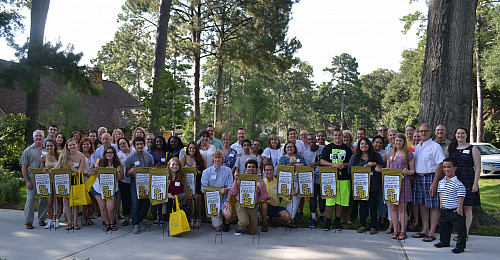
Parent Leadership Gift Council members and fellow parent volunteers warmly welcome new students and their families to Southwestern at send-off parties across the state.
more information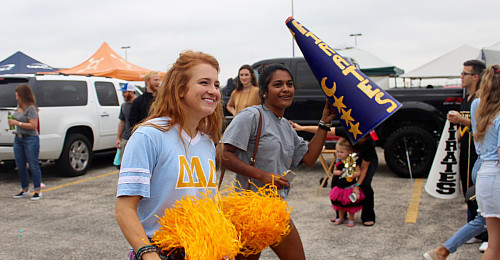
Emilie Moeller ’18 shares how her time at Southwestern transformed her from a shy Unicorn Handler to a confident sorority president and tennis team captain.
more information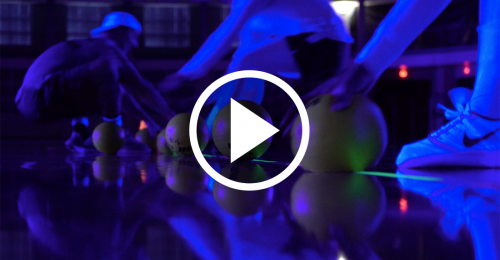
To give you a glimpse into one student’s recent Friday night, Keyshaan Castle ’20 , takes us behind the scenes of a blacklight dodgeball tournament, hosted by Zeta Tau Alpha and SIRA.
more information
Karim Clarke ’26 shares his eye-opening Houston Methodist Research Institute internship journey.
more information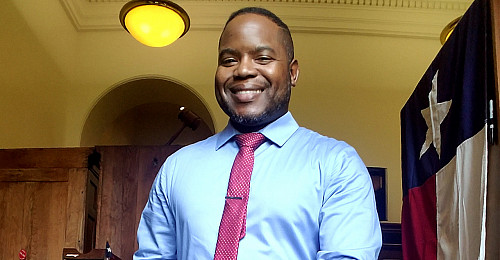
Quincy Holland ’19 is the nineteenth recipient from SU to earn the Texas Association of School Personnel Administrators
more information
Alejandro Medina ’24 demonstrates outstanding potential in computing research by the Computing Research Association.
more information
Student’s study unveils the connections between education, gender, and belief in conspiracy theories.
more information
Karim Clarke ’26 shares his eye-opening Houston Methodist Research Institute internship journey.
more information
Parent Leadership Gift Council members and fellow parent volunteers warmly welcome new students and their families to Southwestern at send-off parties across the state.
more information
Emilie Moeller ’18 shares how her time at Southwestern transformed her from a shy Unicorn Handler to a confident sorority president and tennis team captain.
more information
To give you a glimpse into one student’s recent Friday night, Keyshaan Castle ’20 , takes us behind the scenes of a blacklight dodgeball tournament, hosted by Zeta Tau Alpha and SIRA.
more information
Alejandro Medina ’24 demonstrates outstanding potential in computing research by the Computing Research Association.
more information
Karim Clarke ’26 shares his eye-opening Houston Methodist Research Institute internship journey.
more information
Alejandro Medina ’24 demonstrates outstanding potential in computing research by the Computing Research Association.
more information
SU celebrates four campus community members with the 2024 Mundy Awards and recognizes those who have achieved milestone anniversaries with the University.
more information
SU Business Club collaborates with Houston Methodist Hospital in annual case study competition.
more information
A group of students attended a conference focused on empowering and developing Hispanic leadership.
more information
Students work with faculty and staff to create an interactive digital map of Southwestern’s campus.
more information
Parent Leadership Gift Council members and fellow parent volunteers warmly welcome new students and their families to Southwestern at send-off parties across the state.
more information
Students work with faculty and staff to create an interactive digital map of Southwestern’s campus.
more information
